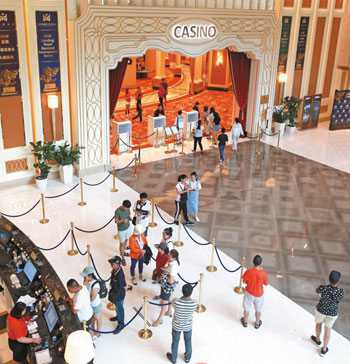New Jeju Casino Rakes in Massive Profits
17 August, 2018

The massive Jeju Shinwha World gambling resort is raking in huge cash from gambling-obsessed Chinese tourists even as other businesses on the island are floundering.
Since opening its doors in February, Shinwha World has raked in W369.4 billion in revenues (US$1=W1,130). Over the whole of last year, the other eight casinos in Jeju only made a combined W136.5 billion. Shinwha World made five times more than Korea's biggest casino, Paradise City in Incheon.
Construction of the resort started in 2014 with a W2 trillion investment from Hong Kong's Landing International Development. It contains a hotel, convention center and shopping mall. A theme park, duty-free shop, water park and concert hall opened in April.
It sits on a piece of land that is equivalent to 85 percent the area of Seoul's Yeouido. Although the number of tourists to Jeju dropped sharply since China's unofficial boycott, Shinwha World seems impervious. Some 350,000 foreigners have stayed at the resort so far, and 115,000 of them visited the casino.
Visitors line up outside the casino at the Jeju Shinwha World resort on Tuesday.
The casino focused on VIP marketing, which draws 80 percent of its revenues from the top five percent of spenders. The casino has 165 gaming tables. Song Woo-seok, who is in charge of casino operations, said, "In other casinos, only 15 percent of the tables are for VIPs, but at Shinwha it's half."
High rollers are offered free air tickets and hotel rooms as well as limousine pick-up service at the airport. Unlike other casinos, Shinwha World managed to reduce the proportion of customers from mainland China to 50 percent, compared to 90 percent elsewhere in Asia.
Parts of Shinwha World opened in April last year, just when Beijing started its unofficial boycott of Korean products and services, while banning group tours to Korea. That resulted in a sharp decline in the number of mainland Chinese visitors to Jeju.
But Serena Eng, the vice president of marketing at the casino, said, "We put together teams to handle VIP guests from Taiwan, Japan, Hong Kong and Macao and hired more staff who can speak Cantonese and Taiwanese Mandarin rather than Beijing-style Mandarin."
Korea needs big resort complexes to attract tourists since it does not have a wide variety of attractions other than shopping districts and sights related to the Korean Wave.
Since Singapore opened the glitzy Marina Bay Sands resort in 2010, the number of tourists rose 69 percent from 9.68 million in 2009 to 16.4 million last year.
Tourism industry insiders in Singapore say that a resort complex that generates US$7 billion in annual revenues results in almost a 1.5 percent rise in GDP over five years. Lee Ki-jong at Kyunghee University said, "We need to change our negative view of casinos as being simply gambling dens. Resort complexes will not only aid the tourism industry but also stimulate private spending."
